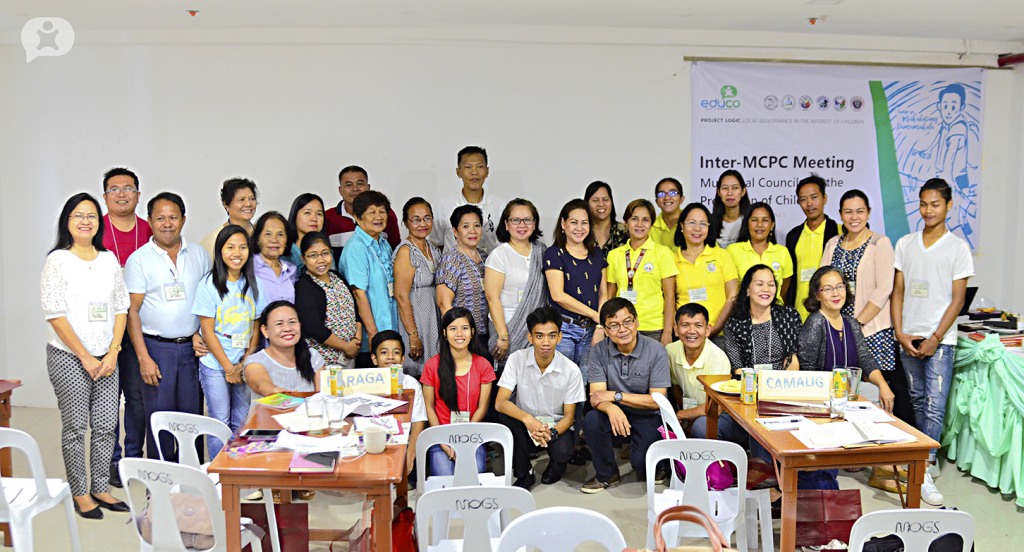A baseline study recently conducted in select municipalities of Bicol reveals that most Local Councils for the Protection of Children (LCPC)—especially in barangays—have low awareness on their mandates as primary duty bearers of child rights in their communities. LCPCs do not meet every quarter, have no annual work and financial plans, nor engage children’s meaningful participation in decisions the councils make.
Children and the Government
LCPCs were created in 1967 through Republic Act 4881. It serves as the umbrella organization for children’s concerns in city and municipal levels. LCPCs are composed of the Mayor/Captain (as council chairman), Health Officer, Supervising Teacher, Chief of Police, Social Worker, and Parent-Teacher Association Representative.
LCPCs started enjoining child representatives when the Philippine Government ratified the United Nations Convention on the Rights of the Child. The Child and Youth Code of 1974 later mandated LCPCs in all other local government units and created the Council for the Welfare of Children. The Department of the Interior and Local Government assists and monitors all LCPCs.
‘Tungo sa Makabatang Pamamahala’
Educo Philippines, through ‘Project LoGIC: Local Governance in the Interest of Children,’ is now helping local governments establish structures more responsive to the rights and wellbeing of children. This is why between February and March of this year, Educo reviewed LCPC documents from 2015 to 2016. Focused group discussions were also conducted with council members.
Results of this baselining study were presented to partner-municipalities at a meeting held on 24 March 2017 in Guinobatan, Albay. Departments of Interior and Local Government and Welfare and Development, through their division offices in Albay, also attended the event.

Members of Municipal Councils for the Protection of Children (MCPC) as well as DILG and DSWD Albay attended Project LoGIC’s presentation of the results of its baseline study during a meeting held on 24 March 2017 in Guinobatan, Albay. Photo by Grekka Sarmiento.
Initial Results
Six partner local governments in the Provinces of Albay and Camarines Sur were involved in the study. This includes the Municipalities of Camalig, Daraga, Oas, Guinobatan, and Ligao City of Albay as well as Nabua of Camarines Sur. Of the six, five have no quarterly meetings or development plans specifically for children. Five are organized through executive orders and have at least one child as a council member.
All 59 barangays covered by Educo’s baseline study do not have regular quarterly meetings. Instead, concerns related to children are tackled during regular sessions. While Philippine law mandates that 1% of the local government’s budget be allotted for children, this is instead often taken from the 5% budget for Gender and Development, which should not be the case. If there is a budget for children, these are spent without children’s participation in decision-making because most barangays child protection councils have no child members.
Most children in municipalities and barangays are not organized. This means that the few children who sit in councils are selected and, therefore, may not be able to accurately represent the voice of all children within a community by him or herself.
Among 60 primary public schools, there are coordinators for child protection or disaster preparedness instead of committees. Schools usually do not have child protection and preparedness plans. Issues on these are only tackled at parent-teacher assemblies, which happens a few times a year. While children are organized through Supreme Pupil/Student Governments[*], schools do not engage child participation in crafting investment plans.
Partner municipalities had no major disagreements to the results of the study which focused mainly on indicators in policies, budget, and plans during the results presentation. Municipal councils however added updates on their programs for children. They shared progress on alternative learning systems, differently abled children, teenage pregnancy, cyber safety, disaster preparedness, and in organizing parents for better awareness on programs for children.
Moving Forward
With the baselining completed, local governments are equipped with evidence and better guided in becoming more child-friendly. According to SALIGAN-Bikol, Educo Philippines’s legal partner in implementing Project LoGIC, the next steps for Municipal Councils for the Protection of Children are to train on mainstreaming child rights in local plans and policies, do write-shops to craft Children’s Codes and project proposals, and develop communication materials to support projects for children. Partner-municipalities of Project LoGIC will convene again in June 2017.
The full and completed baseline report will be released in April 2017. Photos of Project LoGIC’s 1st Inter-MCPC meeting can be viewed here.
[*] According to the Department of Education, Pupil/Student Governments are authorized to implement additional programs, projects and activities outside the usual academic work in schools nationwide. See Department Order 49 Series 2011.
#####
Educo Philippines
Educo is an international development organization that works with child rights holders and duty bearers to build communities where all children enjoy inclusive, quality, and transformative education in a safe and enabling environment.
Media Contact
Grekka G.C. Sarmiento
Email: info@educo.org.ph
Phone: +63 52 481 2100 | Fax: +63 52 481 2111 local 110
Facebook.com/EducoPH | Twitter.com/EducoPH




